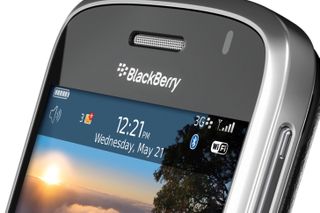RIM: BlackBerrys can replace desk phones
Research in Motion looks to take on enterprise telephony systems with its smartphones.

BlackBerry smartphones could replace desk phones and even challenge PC-based internet telephony, according to Research in Motion (RIM).
The company believes that its Mobile Voice System, (MVS) and the new release of its BlackBerry Enterprise Server will allow businesses with large numbers of mobile workers to dispense with fixed-line phones, but without some of the quality and complexity that can come with WiFi-based Internet telephony.
At a media briefing ahead of Mobile World Congress, Research in Motion said that it is in talks with a number of mobile operators in Europe, with a view to launching MVS-based services that would allow companies to use BlackBerry devices for internal, as well as external calls, and to give staff one single "enterprise" contact number for both.
Although RIM declined to give specific details, a similar arrangement with Canadian operator Rogers gives customers free calls to BlackBerry devices within a local area. This allows staff to transfer calls from their office phone system or PBX to a BlackBerry at no additional cost.
Staff using MVS-connected handsets have access to very similar features to existing PBX users, including short-code dialling, as well as additional functionality such as automated connections to conference calls. One Canadian customer, distributor Jam Industries, says it saw a return on investment of under four months for MVS.
"We are now able to replace desk phones with smart phones," said David Heit, senior product manager at RIM. "For users who are seldom at their desks, why have a desktop phone, when one device can do it all?"
Companies save money by routing long-distance and international calls through their PBX and possibly, via voice over IP, for example between international branches. Businesses also gain from the call logging and asset tracking features that are built into MVS and the BlackBerry Enterprise Server, said Heit.
Get the ITPro. daily newsletter
Receive our latest news, industry updates, featured resources and more. Sign up today to receive our FREE report on AI cyber crime & security - newly updated for 2024.
However, calls between the BlackBerry and the PBX are carried over the mobile network, rather than VoIP - a data connection between the BlackBerry and the MVS server is used for call set up and routing. The MVS connects to the existing PBX, either via SIP (Session Initiation Protocol) or via a media gateway. Businesses do not need to upgrade their PBX to IP telephony, in order to use MVS, according to Heit.
Research in Motion said that, based on current technologies, WiFi-based VoIP cannot compete with cellular connections for either reliability or coverage.
But Heit conceded that in markets such as the UK, where businesses pay a much higher rate to call a mobile phone than to call a landline, cellular-only systems might lose some of their appeal, unless operators offer suitable tariffs for connections between the MVS and the handheld devices.
"Organisations like BT, Orange and Vodafone see this as a tremendous opportunity to participate in this space," said Heit. A new version of MVS is due for release in June this year.
Gartner has predicted that 40 per cent of office workers will ditch their office phone within the next four years.




